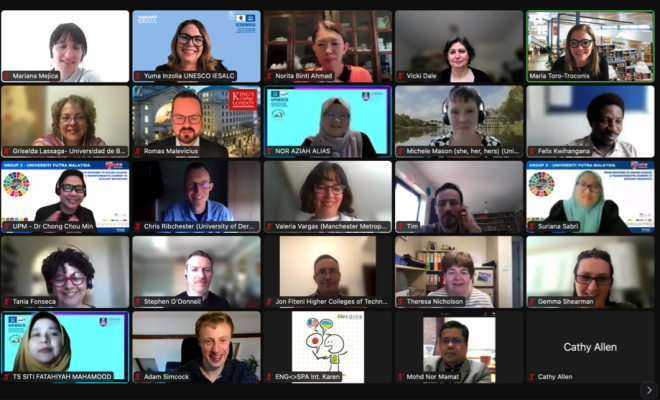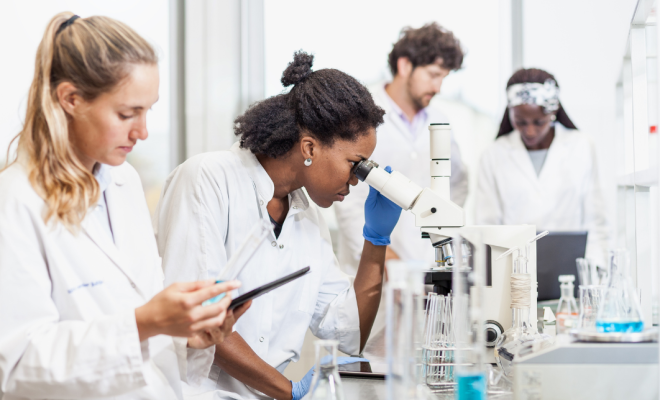Latin American youth propose 6 lines of action to transform education

On September 21, the Regional Dialogue on Innovative Learning in Latin America and the Caribbean was held within the framework of UNESCO’s “Young People on Transforming Education Project”. This joint initiative between UNESCO IESALC and UNESCO ICUA, brought together six prominent young people from the region, who shared their experiences and perspectives on the status, obstacles and opportunities posed by the implementation of innovative learning, as a way to contribute to the transformation of education in Latin America.
The dialogue began with a contextualization of the standard learning practices in the region by the panelists. The diverse realities presented in their interventions, showed us the particularities of each country, but also revealed us the common challenges present in the region. Socioeconomic inequality being one of them, as expressed by Monica Carrillo (Mexico): “It affects many children and adolescents…This leads us to think of education not as a right but as a privilege”.
Meanwhile, Rocío Lucero and Agustina Conde (Argentina) emphasized the importance of bridging the digital gap: “After the pandemic there was a greater emphasis on digital tools, this generates an advantage for some and a handicap for others, because not everyone has access to these tools”. According to them, the situation caused by the pandemic forced the adoption of measures for which the educational institutions were not prepared, deepening the cognitive loss and the loss of learning opportunities.
The need to internationalize university education was also highlighted, with the aim of sharing experiences, learning and knowledge, promoting a global and planetary vision, as Amanda Bennett (Costa Rica) pointed out: “We focus too much on our own contexts and do not realize how we affect as a community, as humanity, other generations, other cultures”. This idea is reinforced by the need to learn languages to promote intercultural dialogue and student mobility, as Matías Vargas (Costa Rica) pointed out.
At the same time, the different ways in which they could support innovative learning were explored. For Mauricio Pahuara (Peru) “The student must have a more active participation and the school must awaken a feeling of search and participation that goes beyond the classroom. The educational offer must be accessible, relevant and of quality and promote the development of soft skills”.
It is also important to build the foundations for the exercise of global citizenship, which implies the development of critical thinking, solidarity and empathy with others, strengthening the connections that exist between their local context and the rest of the world. In this sense, Amanda Bennett considers “eco-literacy” as a possible way to promote this, highlighting the need to care for and preserve the planet, raising awareness of the enormous challenges involved in mitigating the causes of climate change.
Also Mónica Carrillo (Mexico) highlighted the importance of socioemotional education to take care of the mental health of students and give them better tools to overcome uncertain situations that may arise.
Finally, the event featured the participation of Miriam Alpizar, Vice-Minister of Higher Education of Cuba , who made emphasis during her speech on the need for ongoing teacher training, the strengthening of the student movement and the establishment of alliances between countries, institutions, companies and youth organizations to achieve common goals.
Pillars for change
From these testimonies, we can highlight six pillars on which this transformation of education proposed by young people is based:
1. Quality: The educational offer must guarantee that the processes of teaching, research and social linkage raise their quality standards and their adaptation to the realities in which they are developed.
2. Inclusion and accessibility: education must leave no one behind, it must be a public good and also create a safe space where all diversities are welcomed and respected.
3. Internationalization: there must be a greater emphasis on student integration not only in the region but also with the world.
4. Global citizenship: ensure that training is oriented towards the generation of knowledge and experiences that grants a sense of interconnectedness that enables empathy and collaboration to address the global challenges we face.
5. Technology: we must concentrate our efforts to overcome the technological gap in the region, modernize facilities, equipment, techniques and pedagogies that allow us to train competitive professionals and
6. Environment: faced with the imminent challenge of climate change, education must join forces to raise awareness of the importance of everyone’s active participation in the preservation of our planet.
Author:
Teodoro Pearce Maury
Consultant, UNESCO IESALC
RELATED ITEMS








